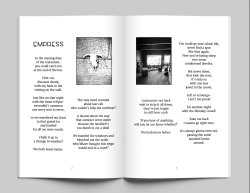Cassia Hardy's record In Relation is out on May 23! Here's an essay from the accompanying zine written by Kyla Pascal about the Empress Ale House, titled "Reflections on Community + space".
As you stepped in from the cold December afternoon, the bar was hot and loud. Squeezing your way through the crowd, passing the barflies insistent on remaining perched on their stools. The band was playing Christmas carols and at the back of the bar was a bake sale, homemade cookies and Christmas treats spread across tables in tupperware – a fundraiser for a local homeless shelter.
The Empress was a place of community. For the lonely man after his late shift at Safeway, the beers for queers (one of the few safe queer drinking spaces in the city), the comedians fumbling their way through a tight five on comedy night. A handful of shows a month, the upcoming list of performances scribbled across laminated sheets, hung behind the bar. In the summertime, the patio was packed. You’d disregard the taste of Empress Ale for the fact that you are all together under the sun.
Third spaces, a term coined by sociologist Ray Oldenburg, describe locations outside the home (the first place) and the workplace (the second place) where people can connect and gather. As we move away from traditional third spaces such as churches, community halls, and legions, we’ve shifted towards alternatives.
The Empress was just that: a welcoming space, regardless of your colour, sexuality, or class. It was a place to watch an album release show, compete in a trivia night, catch a playoff game, fundraise, or simply catch up with friends.
The number of third spaces is quickly dwindling. Suburban sprawl, changing work patterns that reduce recreational time, and the lasting impact of a pandemic have led to a significant decline in people's connections.
Headlines over the past few years have painted a grim picture for small businesses, local art scenes, and the overall sense of community. Articles highlight the ever-changing arts and culture industry, business reports point to rising costs straining live music, and the Canadian government released a social survey report on increasing loneliness.
The Empress, like many spaces, was a casualty of the pandemic and a greedy landlord who placed profit over community. On August 1, 2020, The Empress Ale House closed its doors for good. Beyond The Empress, we’ve lost other businesses, venues and events to congregate. We saw festivals dissolve and organizations shrink. We’ve lost ways to hear about what people are creating and how we can support their latest projects and releases.
The work of gathering feels different now. It’s harder to find out about upcoming shows, people have moved away, and people have passed on. Our opportunities for connection seem to become less and less.
When you drive by, you would barely recognize The Empress Ale House save for the red exterior. Following its closing, Cannabis Bay was the next tenant. The space was grossly illuminated with florescent lighting and the gaudy signage was a cruel reminder of where a watering hole, a music venue, and a safe space once existed. As of very recently, the space once again sits empty.
However, in the past year, Sue Kiernan, owner of The Empress Ale House has opened a new spot, Southbound Brewing. And we’ve seen other community members build new spaces and create new ways to connect. In the face of increasing loneliness, closing businesses and a weary arts community, we must support our community spaces and local artists. In the grieving of our beloved Empress, we are reminded that gathering is an essential part of our lives and that through community support and collaboration, we can build places and spaces that uplift, invite, and connect.
--
Kyla Pascal (she/her) is an Afro-Indigenous (Dominican/Métis) woman born and raised in Amiskwaciwâskahikan / ᐊᒥᐢᑲᐧᒋᐋᐧᐢᑲᐦᐃᑲᐣ (Edmonton). Her experiences and interests are centred around Indigenous resurgence, cultural preservation through archival and memory work, storytelling, and food justice. She is a community planner, an artist, a core member of Ociciwan Contemporary Art Centre and co-editor of Hungry Zine. Pascal’s writing has been featured in a number of publications such as Briarpatch, Herizons, and SNAPline. The goal of her work is to build more resilient, connected, and healthier communities.
